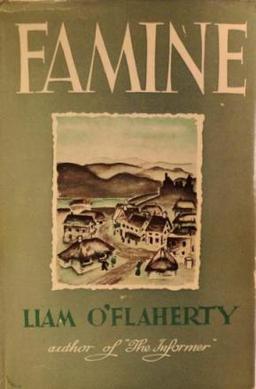Famine (O'Flaherty novel)
Famine is a novel by Irish author Liam O'Flaherty, published in 1937. The book explores the Great Famine in Ireland in the 1840s, focusing on the harrowing effects of the potato blight on rural communities. Through its vivid portrayal of the suffering endured by the Irish people, as well as the social and political dynamics of the time, Famine provides a poignant commentary on the human condition and the struggle for survival.
Plot Summary[edit | edit source]
The novel follows the lives of several characters in a small village in the west of Ireland. The central figure is Michael, a farmer who, along with his family, faces the devastating impact of the potato blight. As the primary food source fails, the community is plunged into starvation, disease, and death. The narrative delves into the responses of various characters to the crisis, including their efforts to find food, the breakdown of social order, and the interventions (or lack thereof) by the authorities and the church.
Themes[edit | edit source]
Famine addresses several key themes, including survival, injustice, and resilience. The novel critiques the British government's response to the famine, highlighting the inadequacy of relief efforts and the exacerbation of suffering through policies such as evictions and corn laws. It also examines the role of the Catholic Church during the crisis, exploring both moral and ethical dilemmas faced by clergy members. The resilience of the human spirit in the face of unimaginable hardship is a central motif, showcasing the characters' determination to survive against all odds.
Reception[edit | edit source]
Upon its release, Famine was praised for its unflinching depiction of the famine's brutality and its empathetic portrayal of the affected Irish population. Critics lauded O'Flaherty's ability to humanize historical events, making the suffering of the past palpable to contemporary readers. The novel has since been recognized as a significant work of Irish literature, contributing to the understanding and memory of the Great Famine.
Legacy[edit | edit source]
Famine has had a lasting impact on Irish cultural memory and historical narrative. It is considered an important work for its contribution to the discourse on the Great Famine, offering insights into the socio-political factors that compounded the disaster. The novel has also been studied for its literary qualities, including its narrative structure, character development, and thematic depth.
This article is a literature-related stub. You can help WikiMD by expanding it!
Search WikiMD
Ad.Tired of being Overweight? Try W8MD's physician weight loss program.
Semaglutide (Ozempic / Wegovy and Tirzepatide (Mounjaro / Zepbound) available.
Advertise on WikiMD
|
WikiMD's Wellness Encyclopedia |
| Let Food Be Thy Medicine Medicine Thy Food - Hippocrates |
Translate this page: - East Asian
中文,
日本,
한국어,
South Asian
हिन्दी,
தமிழ்,
తెలుగు,
Urdu,
ಕನ್ನಡ,
Southeast Asian
Indonesian,
Vietnamese,
Thai,
မြန်မာဘာသာ,
বাংলা
European
español,
Deutsch,
français,
Greek,
português do Brasil,
polski,
română,
русский,
Nederlands,
norsk,
svenska,
suomi,
Italian
Middle Eastern & African
عربى,
Turkish,
Persian,
Hebrew,
Afrikaans,
isiZulu,
Kiswahili,
Other
Bulgarian,
Hungarian,
Czech,
Swedish,
മലയാളം,
मराठी,
ਪੰਜਾਬੀ,
ગુજરાતી,
Portuguese,
Ukrainian
Medical Disclaimer: WikiMD is not a substitute for professional medical advice. The information on WikiMD is provided as an information resource only, may be incorrect, outdated or misleading, and is not to be used or relied on for any diagnostic or treatment purposes. Please consult your health care provider before making any healthcare decisions or for guidance about a specific medical condition. WikiMD expressly disclaims responsibility, and shall have no liability, for any damages, loss, injury, or liability whatsoever suffered as a result of your reliance on the information contained in this site. By visiting this site you agree to the foregoing terms and conditions, which may from time to time be changed or supplemented by WikiMD. If you do not agree to the foregoing terms and conditions, you should not enter or use this site. See full disclaimer.
Credits:Most images are courtesy of Wikimedia commons, and templates Wikipedia, licensed under CC BY SA or similar.
Contributors: Prab R. Tumpati, MD

